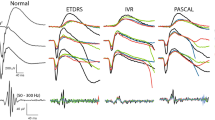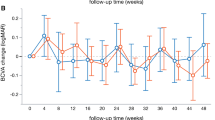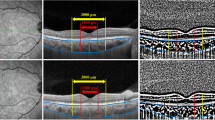Abstract
To evaluate changes in electroretinographic (ERG) findings after panretinal photocoagulation (PRP) compared to PRP plus intravitreal injection of ranibizumab (IVR) in eyes with high-risk proliferative diabetic retinopathy (PDR). Patients with high-risk PDR and no prior laser treatment were assigned randomly to receive PRP (PRP group; n = 9) or PRP plus IVR (PRPplus group; n = 11). PRP was administered in two sessions (weeks 0 and 2), and IVR was administered at the end of the first laser session (week 0) in the PRPplus group. Standardized ophthalmic evaluations including (ETDRS) best-corrected visual acuity (BCVA), and fluorescein angiography to measure area of fluorescein leakage (FLA), were performed at baseline and at weeks 16 (±2), 32 (±2) and 48 (±2). ERG was measured according to ISCEV standards at baseline and at week 48 (±2). At 48 weeks, 2,400–3,000 laser spots had been placed in eyes in the PRP group, while only 1,400–1,800 spots had been placed in the PRPplus group. Compared to baseline, there was a statistically significant (P < 0.05) FLA reduction observed at all study visits in both groups, with the reduction observed in the PRPplus group significantly larger than that in the PRP group at week 48. ROD b-wave amplitude was significantly reduced to 46 ± 5 % (P < 0.05) of baseline in the PRP group and 64 ± 6 % (P < 0.05) in the PRPplus group. This reduction was significantly larger in the PRP group than in the PRPplus group (P = 0.024; t Test). Similar results were observed for the dark-adapted Combined Response (CR) b-wave amplitude, with a reduction at 48 weeks compared to baseline of 45 ± 4 % in the PRP group and 62 ± 5 % in the PRPplus group; the reduction in CR b-wave amplitude was significantly larger in the PRP group than in the PRPplus group (P = 0.0094). CR a-wave, oscillatory potentials, cone single flash, and 30 Hz flicker responses showed statistically significant within-group reductions, but no differences in between-group analyses. These results suggest that treating high-risk PDR with PRP plus IVR is effective for PDR control, and permits the use of less extensive PRP which, in turn, induces less retinal functional loss, in particular for rod-driven post-receptoral responses, than treatment with PRP alone.




Similar content being viewed by others
References
Klein R (1992) Retinopathy in a population-based study. Trans Am Ophthalmol Soc 90:561–594
ETDRSResearchGroup (1991) Fundus photographic risk factors for progression of diabetic retinopathy. ETDRS report number 12. Early treatment diabetic retinopathy study research group. Ophthalmology 98:823–833
Vander JF, Duker JS, Benson WE, Brown GC, McNamara JA, Rosenstein RB (1991) Long-term stability and visual outcome after favorable initial response of proliferative diabetic retinopathy to panretinal photocoagulation. Ophthalmology 98:1575–1579
Flynn HW Jr, Chew EY, Simons BD, Barton FB, Remaley NA, Ferris FL 3rd (1992) Pars plana vitrectomy in the early treatment diabetic retinopathy study. ETDRS report number 17. The early treatment diabetic retinopathy study research group. Ophthalmology 99:1351–1357
ETDRSResearchGroup (1991) Early photocoagulation for diabetic retinopathy. ETDRS report number 9. Early treatment diabetic retinopathy study research group. Ophthalmology 98:766–785
Aiello LP, Avery RL, Arrigg PG, Keyt BA, Jampel HD, Shah ST, Pasquale LR, Thieme H, Iwamoto MA, Park JE, Nguyen HV, Aiello LM, Ferrara N, King GL (1994) Vascular endothelial growth factor in ocular fluid of patients with diabetic retinopathy and other retinal disorders. N Engl J Med 331:1480–1487
Adamis AP, Miller JW, Bernal MT, D’Amico DJ, Folkman J, Yeo TK, Yeo KT (1994) Increased vascular endothelial growth factor levels in the vitreous of eyes with proliferative diabetic retinopathy. Am J Ophthalmol 118:445–450
Folkman J (1971) Tumor angiogenesis: therapeutic implications. N Engl J Med 285:1182–1186
Malecaze F, Clamens S, Simorre-Pinatel V, Mathis A, Chollet P, Favard C, Bayard F, Plouet J (1994) Detection of vascular endothelial growth factor messenger RNA and vascular endothelial growth factor-like activity in proliferative diabetic retinopathy. Arch Ophthalmol 112:1476–1482
Aiello LP, Pierce EA, Foley ED, Takagi H, Chen H, Riddle L, Ferrara N, King GL, Smith LE (1995) Suppression of retinal neovascularization in vivo by inhibition of vascular endothelial growth factor (VEGF) using soluble VEGF-receptor chimeric proteins. Proc Natl Acad Sci USA 92:10457–10461
Matsuyama K, Ogata N, Jo N, Shima C, Matsuoka M, Matsumura M (2009) Levels of vascular endothelial growth factor and pigment epithelium-derived factor in eyes before and after intravitreal injection of bevacizumab. Jpn J Ophthalmol 53:243–248
Sawada O, Kawamura H, Kakinoki M, Sawada T, Ohji M (2007) Vascular endothelial growth factor in aqueous humor before and after intravitreal injection of bevacizumab in eyes with diabetic retinopathy. Arch Ophthalmol 125:1363–1366
Adamis AP, Altaweel M, Bressler NM, Cunningham ET Jr, Davis MD, Goldbaum M, Gonzales C, Guyer DR, Barrett K, Patel M, Macugen Diabetic Retinopathy Study G (2006) Changes in retinal neovascularization after pegaptanib (Macugen) therapy in diabetic individuals. Ophthalmology 113:23–28
Chun DW, Heier JS, Topping TM, Duker JS, Bankert JM (2006) A pilot study of multiple intravitreal injections of ranibizumab in patients with center-involving clinically significant diabetic macular edema. Ophthalmology 113:1706–1712
Cunningham ET Jr, Adamis AP, Altaweel M, Aiello LP, Bressler NM, D’Amico DJ, Goldbaum M, Guyer DR, Katz B, Patel M, Schwartz SD, Macugen Diabetic Retinopathy Study G (2005) A phase II randomized double-masked trial of pegaptanib, an anti-vascular endothelial growth factor aptamer, for diabetic macular edema. Ophthalmology 112:1747–1757
Jardeleza MS, Miller JW (2009) Review of anti-VEGF therapy in proliferative diabetic retinopathy. Semin Ophthalmol 24:87–92
Jorge R, Costa RA, Calucci D, Cintra LP, Scott IU (2006) Intravitreal bevacizumab (Avastin) for persistent new vessels in diabetic retinopathy (IBEPE study). Retina 26:1006–1013
Jorge R, Oliveira RS, Messias A, Almeida FP, Strambe ML, Costa RA, Scott IU (2011) Ranibizumab for retinal neovascularization. Ophthalmology 118(1004–1004):e1001
Diabetic Retinopathy Clinical Research N, Googe J, Brucker AJ, Bressler NM, Qin H, Aiello LP, Antoszyk A, Beck RW, Bressler SB, Ferris FL III, Glassman AR, Marcus D, Stockdale CR (2011) Randomized trial evaluating short-term effects of intravitreal ranibizumab or triamcinolone acetonide on macular edema after focal/grid laser for diabetic macular edema in eyes also receiving panretinal photocoagulation. Retina 31:1009–1027
Filho JA, Messias A, Almeida FP, Ribeiro JA, Costa RA, Scott IU, Jorge R (2011) Panretinal photocoagulation (PRP) versus PRP plus intravitreal ranibizumab for high-risk proliferative diabetic retinopathy. Acta Ophthalmol 89:e567–e572
Tzekov R, Arden GB (1999) The electroretinogram in diabetic retinopathy. Surv Ophthalmol 44:53–60
Matsui Y, Katsumi O, Sakaue H, Hirose T (1994) Electroretinogram b/a wave ratio improvement in central retinal vein obstruction. Br J Ophthalmol 78:191–198
Capoferri C, Bagini M, Chizzoli A, Pece A, Brancato R (1990) Electroretinographic findings in panretinal photocoagulation for diabetic retinopathy. A randomized study with blue-green argon and red krypton lasers. Graefes Arch Clin Exp Ophthalmol 228:232–236
Perlman I, Gdal-On M, Miller B, Zonis S (1985) Retinal function of the diabetic retina after argon laser photocoagulation assessed electroretinographically. Br J Ophthalmol 69:240–246
Frank RN (1975) Visual fields and electroretinography following extensive photocoagulation. Arch Ophthalmol 93:591–598
Shetty R, Pai SA, Vincent A, Shetty N, Narayana KM, Sinha B, Shetty BK (2008) Electrophysiological and structural assessment of the central retina following intravitreal injection of bevacizumab for treatment of macular edema. Doc Ophthalmol 116:129–135
ETDRSResearchGroup (1979) Four risk factors for severe visual loss in diabetic retinopathy. The third report from the Diabetic Retinopathy Study. The diabetic retinopathy study research group. Arch Ophthalmol 97:654–655
Chobanian AV, Bakris GL, Black HR, Cushman WC, Green LA, Izzo JL, Jr., Jones DW, Materson BJ, Oparil S, Wright JT Jr., Roccella EJ, National Heart L, Blood Institute Joint National Committee on Prevention DE, Treatment of High Blood P, National High Blood Pressure Education Program Coordinating C (2003) The seventh report of the joint national committee on prevention, detection, evaluation, and treatment of high blood pressure: the JNC 7 report. JAMA 289: 2560–2572
Marmor MF, Fulton AB, Holder GE, Miyake Y, Brigell M, Bach M, International Society for Clinical Electrophysiology of V (2009) ISCEV Standard for full-field clinical electroretinography (2008 update). Doc Ophthalmol 118:69–77
Naka KI, Rushton WA (1966) S-potentials from luminosity units in the retina of fish (Cyprinidae). J Physiol 185:587–599
ETDRSResearchGroup (1987) Techniques for scatter and local photocoagulation treatment of diabetic retinopathy: early treatment diabetic retinopathy study report no. 3. the early treatment diabetic retinopathy study research group. Int Ophthalmol Clin 27:254–264
ETDRSResearchGroup (1985) Photocoagulation for diabetic macular edema. Early treatment diabetic retinopathy study report number 1. early treatment diabetic retinopathy study research group. Arch Ophthalmol 103:1796–1806
Scholl HP, Zrenner E (2000) Electrophysiology in the investigation of acquired retinal disorders. Surv Ophthalmol 45:29–47
Luu CD, Szental JA, Lee SY, Lavanya R, Wong TY (2010) Correlation between retinal oscillatory potentials and retinal vascular caliber in type 2 diabetes. Invest Ophthalmol Vis Sci 51:482–486
Lecleire-Collet A, Audo I, Aout M, Girmens JF, Sofroni R, Erginay A, Le Gargasson JF, Mohand-Said S, Meas T, Guillausseau PJ, Vicaut E, Paques M, Massin P (2011) Evaluation of retinal function and flicker light-induced retinal vascular response in normotensive patients with diabetes without retinopathy. Invest Ophthalmol Vis Sci 52:2861–2867
Holopigian K, Greenstein VC, Seiple W, Hood DC, Carr RE (1997) Evidence for photoreceptor changes in patients with diabetic retinopathy. Invest Ophthalmol Vis Sci 38:2355–2365
Breton ME, Quinn GE, Keene SS, Dahmen JC, Brucker AJ (1989) Electroretinogram parameters at presentation as predictors of rubeosis in central retinal vein occlusion patients. Ophthalmology 96:1343–1352
Chung NH, Kim SH, Kwak MS (1993) The electroretinogram sensitivity in patients with diabetes. Korean J Ophthalmol 7:43–47
Ogden TE, Callahan F, Riekhof FT (1976) The electroretinogram after peripheral retinal ablation in diabetic retinopathy. Am J Ophthalmol 81:397–402
Slaughter MM, Miller RF (1981) 2-amino-4-phosphonobutyric acid: a new pharmacological tool for retina research. Science 211:182–185
Nilsson SE (1971) Human retinal vascular obstructions. A quantitative correlation of angiographic and electroretinographic findings. Acta Ophthalmol (Copenh) 49:111–133
Acknowledgments
This study was supported by Fundação de Amparo a Pesquisa do Estado de São Paulo (FAPESP) Grant number: 2009/01036-3. Authors would like to thank Prof. John Robson for reviewing and the constructive comments on the manuscript.
Conflict of interest
None.
Author information
Authors and Affiliations
Corresponding author
Additional information
www.clinicaltrials.gov: NCT00993525.
Rights and permissions
About this article
Cite this article
Messias, A., Filho, J.A.R., Messias, K. et al. Electroretinographic findings associated with panretinal photocoagulation (PRP) versus PRP plus intravitreal ranibizumab treatment for high-risk proliferative diabetic retinopathy. Doc Ophthalmol 124, 225–236 (2012). https://doi.org/10.1007/s10633-012-9322-5
Received:
Accepted:
Published:
Issue Date:
DOI: https://doi.org/10.1007/s10633-012-9322-5




